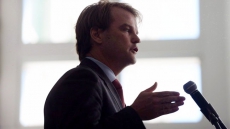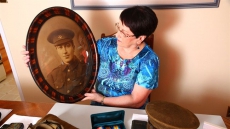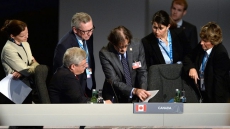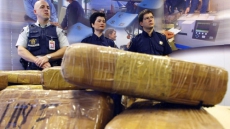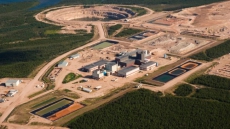OTTAWA - A complete breakdown in the relationship between aboriginal and non-aboriginal Canadians must be repaired for the moral and economic good of the country, a high-profile panel said Thursday.
But while the establishment of Canadians for a New Partnership is being heralded as a way to do so, one First Nations chief says true reconciliation is likely to require more than just dialogue and education.
The new organization is being led by former prime ministers Paul Martin and Joe Clark, alongside aboriginal leaders, activists, academics, judges and artists who are seeking to hold public lectures and debates on issues which divide indigenous and non-indigenous groups to bring the two sides closer together.
The need for such an endeavour was made clear when his children suggested they'd lost hope the situation for aboriginal peoples could ever be improved, said Stephen Kakfwi, a former premier of the Northwest Territories who will run the organization.
"Our efforts, no matter how well intentioned, to improve the health, education and welfare of indigenous peoples are destined to the same failures of the past unless we build a new partnership and restore the trust has been eroded by a litany of historic wrongs," he said.
Back in 2008, the federal government had begun to try and address those wrongs with Prime Minister Stephen Harper issuing his landmark apology for the treatment of First Nations at residential schools.
The apology was seen as an opportunity to close the gap between the two sides, but conflicts over resource development, education and missing and murdered aboriginal women have soured it anew.
Added to that has been a breakdown in the relationship between many aboriginal communities and umbrella organizations which claim to represent them, a phenomenon which manifested itself in the ongoing Idle No More movement.
The organization unveiled Thursday is in part a response to those protests, suggested Ovide Mercredi, the former national chief of the Assembly of First Nations.
"These were spontaneous gatherings of like-minded people that wanted change. That's what we have here too, like-minded people," he said.
"We don't all agree on all the issues like resource development or whatever, but we're here to say we have to start somewhere."
Reaction on social media from some was more skeptical, with criticism of everything from the group's funding sources to the involvement of former prime ministers, with suggestions that if they were truly committed to change they could have done so while in office.
Perhaps taking the issue outside of political circles is what is needed, suggested the Opposition critic for aboriginal affairs.
"Canadians want to resolve a number of the issues, they want us to move forward and it just hasn't been happening with this government," NDP MP Charlie Angus said in an interview.
"So, maybe stepping outside the political realm into more of the social, cultural, diplomatic world with former leaders, I think can play a very important role in building bridges and building dialogue."
When asked for comment on the new organization, the office of Aboriginal Affairs minister Bernard Valcourt issued a statement that made no mention of it.
"Our government will continue to work with aboriginal Canadians to create economic opportunities and improve the quality of life of First Nations," the statement said.
The governing Conservatives have been brought up to speed on the new group's work, said former prime minister Joe Clark.
He said he thinks that they will benefit from learning alongside of all Canadians.
"We believe that among the people who we can influence and we hope involve constructively are members of the present government," Clark said.
Stewart Phillip of the Union of B.C. Indian Chiefs, said he doesn't think that's likely.
Phillip said former prime minister Martin phoned him personally earlier this summer with a pitch to get involved.
While he said he is supportive of the idea, he doesn't think the current government will listen, calling their approach to aboriginal groups ideologically adversarial.
"I truly believe this country needs a new vision, a more inclusive vision of all Canadians and I think the future will bring that about and there will be a change of government," he said.
"We will be better served and be able to get on with the hard work of reconciliation."
But something must also be done now, Liberal Leader Justin Trudeau said in a statement.
"There is an immediate and critical need for a partnership that addresses urgent issues in a manner which respects inherent and treaty rights," he said.
"Canadians For a New Partnership and all those involved should be commended for seeking reconciliation and recognizing that a different approach is required."
Some aboriginal activists have claimed a victory this week in one struggle with the Conservatives, that over the need to examine of why 1,200 aboriginal women have gone missing or been murdered in the past three decades.
The government now says it will consider participating in a roundtable on the issue and while that stops short of the inquiry many have been calling for, protesters who've been camped out at the Manitoba's legislature for days over the issue say it's a step.
"For a man like Stephen Harper to say he might have been wrong, that's a huge victory. That's what we've been praying for," Kylo Prince said Thursday.

